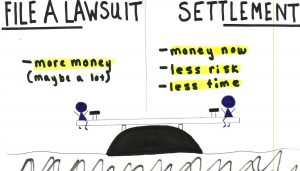 There are a variety of motivations that impact the victim’s decision to settle or go to trial.
There are a variety of motivations that impact the victim’s decision to settle or go to trial.
The victim’s decision. It is worth underscoring: it is the victim’s decision. It is not a choice for the attorneys or the family. The victim has to choose the path that is best for them.
There are certainly some Maryland injury attorneys who do not see it that way. It really is tempting — I’ve felt it — to think you know what is best for your client. I’ve settled cases where I was convinced the offer would double in a matter of weeks. But as a lawyer, your job really is to give your client the information to make an informed choice.
Here are the three key factors victims need to consider: risk, time, and emotional strain.
Risk
The biggest question between pushing forward or setting the case is the risk. The value of cases can rise and fall. But there is a huge difference between the two most critical decision-making points. The first question is whether to file suit or take the settlement offer that is on the table.
Settlement Negotiation Risk
Even if you want to settle, you always want to make a counteroffer. The risk of the insurance company taking an offer off the table is extremely low. I have had two offers in my career go down after suit was filed. The first was with a Selective Insurance adjuster who offered $50,000 on an ankle injury case in Baltimore City. The adjuster said she would pull the offer off the table if we did not accept in within a week. I don’t hate that insurance company. But it sure was a bush-league play. Sure enough, as promised, she took it off the table. The new offer was $0. But the case settled before trial for $150,000. The second case was a victim credibility case where the young girl put lots of video on Facebook that contradicted her injury claim. Even in that case, the value did not go down all that much. So this is two cases out of over 1,000 cases. The take-home message: the risk of filing suit and losing your settlement offer is vanishingly low.
Trial Risk
Of course, a trial is a different issue. A trial can be all or nothing. Your willingness to take on risk is a very personal thing. As lawyers, we reflexively value cases from the standpoint of taking the path that will lead to the best statistical result from an economic standpoint. But this decision between taking the case to six Maryland jurors and a settlement is not a purely economic decision for victims. Because if the client has a 50-50 chance of getting a $1 million verdict and the settlement offer is $450,000, 95% of clients would take the settlement. How about $400,000? $375,000? The decision is based on the client’s psychological propensity or aversion to risk.
Remember the client’s math is different from the attorneys. I always keep in mind that we can act as our own insurance company. We can win enough cases where we can take on risk. We lost a tough case last month where we lost $120,000 in expenses that we put out preparing the case. Tough blow but we had a $5.3 million verdict two weeks before that. So we can absorb the losses. The client has just one case. Which is why that $450,000 offer on the 50% chance of $1 million makes sense.
How much money is at play and the wealth of the client also matters. Is the settlement or verdict life-altering? An affluent client is more likely to gamble with a case value $200,000, but a client down in his luck might, whereas an indigent client faced with the same amount at stake may be content to settle for the certainty of receiving $ 5,000.
It is also worth noting that a client’s risk assessment often changes throughout a case. The insurance company’s risk assessment also changes just before trial. This is why we have so many courthouse steps deals. When it is no longer an abstract concept, everyone assesses risk differently.
Time
Every personal injury lawyer in Maryland has a client right now that needs the money as soon as humanly possible. They bake into their decision their need for immediate money as they well should in most of the cases. But most of our clients are really looking to maximize the value of their claim and while they would like to get their money as soon as possible – there is a time value for money for a reason – they don’t want to compromise their claim. As with risk, it is a very personal decision based on factors that the victim’s attorneys cannot fully understand.
Emotional Strain
For some, the emotional strain and time demands of a jury or the risk of a trial might be reason alone to avoid a trial. How much emotional strain is there? It depends on the case and the plaintiff. We have tried cases with victims who would prefer being fed to sharks to going to trial who ended up enjoying both the process and the outcome. We have also had the opposite: plaintiffs who thought it would be no big deal to go to trial but were terrified when they were called to testify.
To a far lesser degree, we have also had victims who wanted a trial over settlement for a different reason. Some people want to have their day in court for vindication or to inflict punishment on the defendant. This is less frequent because many clients that start out at this point discard these abstract vantage points for the practical realities of what makes the best economic decision.
Let’s Sum It Up
Your decision can be summed up like this:
The key is figuring out the relative weights of these factors to you. Do you need money now? Do you hate risk? Do you want to get every last penny out of your case and are willing to take a chance to get it? You have to figure out who you are and what you really want to make the best decision.
Maryland tort attorneys need to advise clients using cold economic calculus: what is the reasonable settlement zone and settlement range, what is the offer, and what is the range of verdicts in the case. That’s our job. But ultimately the client has to consider the factors above and any other factors personal to them and make the call that is best for the victim and her family.
- Figuring out the value range: data and example cases to place a dollar amount on Maryland personal injury cases
- The next question: how much money can you expect to get when all is said and done?
 Maryland Injury Law Center
Maryland Injury Law Center


